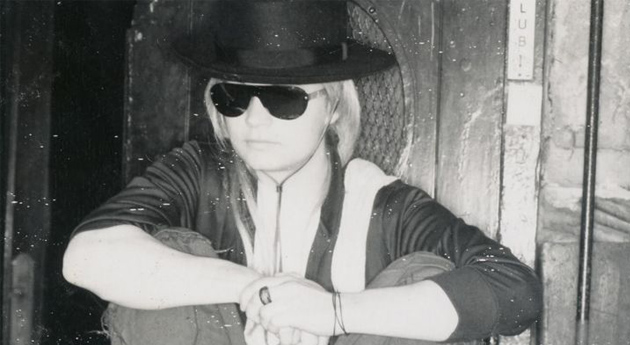
By Eric Kohn | Indiewire
January 25, 2016
The tale of the brilliant non-fiction writer who didn’t exist is retold by his inventor.
The world first knew bestselling teen author JT LeRoy as a truck stop prostitute who started writing at the age of 15, not the 40-year-old mother from Brooklyn who invented him. By the time the truth came out in 2005, San Francisco-based writer Laura Albert had already published several alleged memoirs and attained global stardom. In “Author: The JT LeRoy Story,” director Jeff Feuerzeig tracks Albert’s bizarre scheme in her own words, constructing a fascinating treatise on creative desire, internal grievances and fame as compelling as anything the writer herself dreamed up.
Initially writing under the pseudonym “Terminator,” Albert garnered the interest of the publishing industry for genuine reasons. As one of her early agents puts it, her writing “spoke to an aspect of American culture we hadn’t heard before.” While these talking heads flesh out Albert’s process of shielding her identity, Feuerzeig mainly takes cues from Albert herself, a lively leather-clad woman who narrates her unorthodox rise against a backdrop of her own writing. The visual metaphor is clear enough — she lives in the confines of her own made-up stories — but the twists keep coming. Even those familiar with the basics won’t anticipate every detail Albert offers up.
In her terms, Terminator comes to her as a kind of alternate identity eager to express itself; she often discusses him in the third person. But the most compelling storytelling ingredient here comes from the bountiful tapes of phone calls between Albert and various figures from her real life drama. Slipping in and out of character, Albert initially talks through her personality issues with a therapist, but in short order she’s donning her avatar for conversations with a wide spectrum of big names who admire her work — even if they don’t realize the reality of its conception.
Worshipful callers range from Tom Waits and Courtney Love to Gus Van Sant and Asia Argento, with the last two eagerly pursuing film adaptations of LeRoy’s work. The tapes provide so much insight into Albert’s ability to play her part over the phone that they raise questions of their authenticity, though this uncertainty only adds to the allure of the subject matter.
While hardly a straightforward look at the LeRoy saga, “Author” crams in the highlights, from the immediate ripple effect of fandom surrounding Albert’s first novel “Sarah” to the even greater embrace of “The Heart Is Deceitful Above All Things.” By the time LeRoy becomes a bonafide rock star of the literary scene, Albert has constructed an entire infrastructure to support the plan, including her husband Geoff and Savannah Knoop, who grows more accustomed to playing LeRoy in public than Albert would like. To hear her tell it, even she can’t believe how much she gets away with the idea.
Because “Author” remains in the grip of an unreliable narrator, it leaves many questions on the table.
“It was like magic,” she says, and “Author” allows you to get swept up in it, as Feuerzeig threads together her story with a lively pileup of images, animation and those ubiquitous tapes. The fragmented approach mirrors Albert’s piecemeal construction of her public image.
“Author” hits its most compelling notes as Albert recalls her ability to hack the showbiz circuit, watching her sister-in-law receive praise from U2 (“the Bono talk”) and hang with the seductive Argento. But it’s Albert’s decision to confide in Smashing Pumpkins frontman Billy Corgan and “Deadwood” creator David Milch about her identity that stands out, less for her candor than their reactions to it. While many felt betrayed by Albert’s choices, the open-minded perspectives of this pair suggest a deeper reading of her decision. Was JT LeRoy truly a hoax — or, in an era defined by slippery personalities hiding behind digital veils, somehow also real?
Because “Author” remains in the grip of an unreliable narrator, it leaves many questions on the table. Albert’s family — her husband and young child — remain shadowy figures only discussed through Albert’s asides. The specifics of her finances and legal processes remain underserved. But Feuerzeig, who previously explored a troubled artistic recluse with the comparatively traditional “The Devil and Daniel Johnston,” does a fine job of keeping the focus on the abstract, existential dilemma as Albert faces it. Visiting the set of Argento’s “Heart” adaptation, she recalls the strangeness of watching Argento play an invented character as if it had once existed. Albert is especially adroit at explaining her conundrum. “My Barbie dolls have come to life,” she says.
As “Author” wrestles with the nature of identity as well as Albert’s shaky moral standing, it builds toward a finale in which everything falls apart. It’s tricky to parse the extent to which Albert deserves the ire sent her way, given how much she presents herself as a victim of a fragile emotional state. Even Albert can’t sort it all out. “The levels of it are absurd,” she says, and at least this much we know to be true.
Grade: A-


